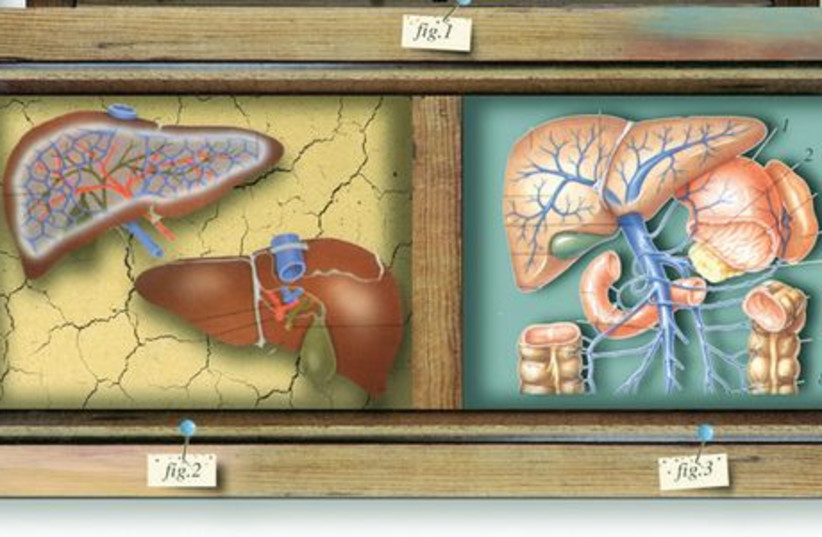Hadassah-University Medical Center in Jerusalem’s Ein Kerem recently set a record, performing 12 liver and kidney transplants in less than 14 days. No other Israeli hospital can boast the same.
The transplants were performed by large teams headed by Dr. Abed Khalaileh, an Arab surgeon from east Jerusalem who is an expert in general surgery and head of the hospital’s transplant unit. In less than two weeks, the team performed six liver transplants and six kidney transplants, and some of the recipients have already been discharged and returned home.
Hadassah’s transplant center “is a center of excellence that in recent years has demonstrated impressive achievement and maintaining patients’ safety,” Hadassah Medical Organization Director-General Prof. Yoram Weiss said. “It is a great source of pride for us.”
Although the death toll from road accidents in the country totaled 19 people over the past week, this was not the reason for the record number of Hadassah transplants. Some of the donations were altruistic giving of kidneys or transplantation of a liver lobe from a tissue-compatible family member whose lobe will grow back. The recipients were men and women aged 38 and up. A dozen recipients suffered from prolonged kidney or liver diseases whose condition deteriorated to the point of needing a donated organ.
The public’s willingness to donate organs, either their own or from their deceased loved ones, has increased in recent years, Hadassah said. About 250 Israelis choose to donate their kidneys each year – quadruple the number of live donations there were a decade ago.

Israel leads in worldwide organ donations
“In the last month, we have seen a significant increase in organ donations in Israel and, as a result, a significant increase in the number of transplants performed throughout the country, which is reflected immediately in our center,” Khalaileh said. “Such intensity and high numbers of organ transplants within such a short period of time testify, above all, to the extensive teamwork that takes place here in Hadassah every day. I liken it to a coordinated and harmonious orchestra of excellent people, whose performance in kidney and liver transplants, as well as combined transplants, is made possible thanks to the determination and perseverance and great desire of all of them to save lives.”
“We combine forces that begin with long-term medical treatment at the Hadassah Liver Institute or the nephrology department,” he said. “The doctors and nurses take care of patients whose condition is not simple and accompany them through all the stages of the disease, from the diagnosis, which is sometimes challenging and complex and poses quite a few difficulties, through the treatment adapted to chronic patients to the stage of transplantation and, of course, after that, with close follow-up throughout their lives. Warm relationships are created here that last for years, and when we enter the picture, we feel that we have definitely joined a whole family.”
“All transplant and donation surgeries at Hadassah are always performed by at least two surgeons specializing in transplants, with the aim of achieving the best results and out of commitment to the living organ donors,” Khalaileh said. “Next, the team members of the Hadassah transplant clinics follow up hundreds of organ-transplant recipients and provide each one with a personal and professional relationship that guarantees the success of the process.”
Hadassah’s transplant unit operates under the department of general surgery and is one of the oldest in Israel. It began performing kidney transplants in the 1970s and performed the first successful liver transplant in the country in 1991. The surgeon who performed it was also an Arab, Prof. Ahmed Eid.
The donors – who perform a wonderful deed, whether it is a relative who is determined to save his family member or an altruistic donor who comes through the Gift of Life organization and does not even know to whom he will donate before performing the transplant – deserve special recognition, Khalaileh said.
The large medical staff involved in the transplants include the anesthesia team, the intensive-care teams, the operating-room teams, the imaging team, social services, the Liver Institute and the gastroenterology and nephrology departments, the nursing staff, social workers, organ donation coordinators and administrative workers.
Darja, a kidney-transplant recipient who, as a toddler, immigrated with his mother to Israel from Ethiopia, said: “What do you say to someone who saves your life? No words are enough.”
Khalaileh, one of seven sons born to a Palestinian family in Jerusalem, performs two scheduled liver or kidney transplants plus an emergency transplant or two each week.
After a brief interest in engineering, he decided to study medicine and traveled to Russia to earn his first degree.
After his experience abroad, he returned and began his medical career at Hadassah in 2002, where he specialized in surgery.
Khalaileh went to France and Turkey to learn more and completed a doctorate at the Hebrew University of Jerusalem in evolutionary biology, specializing in the genetic cycles of pancreatic cancer. He became head of kidney transplants and then all solid-organ transplants.
